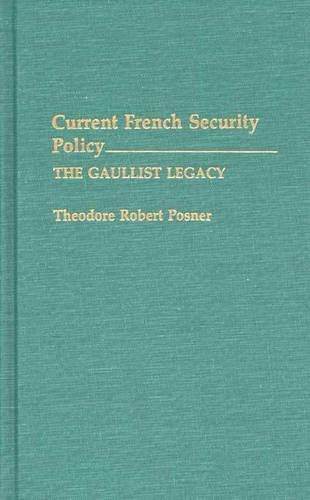
Current French Security Policy: The Gaullist Legacy
(Hardback)
Publishing Details
Current French Security Policy: The Gaullist Legacy
By (Author) Theodore Posner
Bloomsbury Publishing PLC
Praeger Publishers Inc
30th November 1991
United States
Classifications
Tertiary Education
Non Fiction
International relations
355.033544
Physical Properties
Hardback
184
Description
This analysis of France's role in Europe's new security order adds a new perspective to a post-Cold War security dialogue that has focused on the superpowers and Germany. Theodore Posner provides a historical framework for his comprehensive study of current French security policy, and he links broad themes to changes in operations. This overview of current European politics, security issues, and modern-day French political life is intended for a broad audience of students, teachers, and policymakers in military studies, political science, and world history. The study takes as its point of departure the 1960s, when Charles de Gaulle offered Western Europe a model of cooperative security that challenged the US model. Since Europe's political transformation and the end of the Cold War has altered the earlier security framework, the time is now ripe for a new model. The study defines how a French model might look institutionally today and how a French model might look institutionally today and how France could provide new leadership, but concludes that the strong initiative for doing so is probably lacking. This study is important also in analyzing events from a historical perspective and in viewing policies made at the highest level and at the operational level as well.
Reviews
The changes in world politics brought about by the end of the Cold War have prompted much rethinking of security matters in Europe, the dilemma over security policy among NATO members being a case in point. Posner (a student at Yale Law School specializing in security policy in Europe) examines in the light of current developments the set of security assumptions under which France has operated since the Gaullist period of the 1960s. Among the ideas Posner explores is that while France in the bipolar world may have played the part of a second-rank power, in the emerging multipolar world it could be a major player. In his introduction, the author examines recent changes and poses a set of opportunities for France, and in the book's four chapters treats the debate over NATO (integration versus cooperation), French military potential, the concept of European security, and the Gaullist legacy. The book is heavily documented and has a substantial bibliography of English and French-language sources. Graduate collections.-Choice
"The changes in world politics brought about by the end of the Cold War have prompted much rethinking of security matters in Europe, the dilemma over security policy among NATO members being a case in point. Posner (a student at Yale Law School specializing in security policy in Europe) examines in the light of current developments the set of security assumptions under which France has operated since the Gaullist period of the 1960s. Among the ideas Posner explores is that while France in the bipolar world may have played the part of a second-rank power, in the emerging multipolar world it could be a major player. In his introduction, the author examines recent changes and poses a set of opportunities for France, and in the book's four chapters treats the debate over NATO (integration versus cooperation), French military potential, the concept of European security, and the Gaullist legacy. The book is heavily documented and has a substantial bibliography of English and French-language sources. Graduate collections."-Choice
Author Bio
THEODORE ROBERT POSNER, a student at Yale University Law School, is specializing in the study of security policy in Europe.
